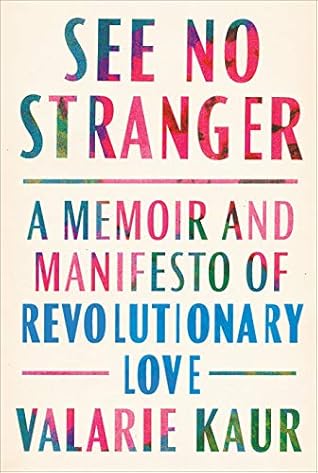More on this book
Community
Kindle Notes & Highlights
by
Valarie Kaur
Read between
September 3 - September 29, 2021
“Revolutionary love” is the choice to labor for others, for our opponents, and for ourselves in order to transform the world around us. It begins with wonder: You are a part of me I do not yet know.
But separateness is an illusion. When we quiet the chatter in our heads through music or meditation or recitation or song, the boundaries begin to disappear. The bowl breaks. For a moment, we taste the truth, sweet as nectar—we are part of one another.
In La’Kech, “You are my other me.”
I had fallen for the great bribe of white supremacy: the promise of acceptance for people of color who put down other people of color.
I discovered that the margin can be a space of strength—I could see what others could not see; I could tell stories no one had heard.
Wonder is an admission that you don’t know everything about another.
Any theology that teaches that God will torture the people in front of you in the afterlife creates the imaginative space for you to do so yourself on earth.
There was no such thing as fearlessness. There was only the choice to hide or to go toward the thing you are most afraid of.
Sacred spaces are extensions of our own bodies, and when they are violated, our bodies hurt from the inside.
The more you love, the more you grieve.
suppressing grief is what causes the real damage—depression, loneliness, isolation, addiction, and violence.
I was learning how to witness emotions without getting overwhelmed by them. When I wanted to shut down, I tried again to wonder about the person in front of me and ask the next question.
Mother Teresa once said, “If I look at the mass, I will never act. If I look at the one, I will.”
Unresolved grief inside a person is tragic; unresolved grief inside a nation is catastrophic: It releases enormous aggression.
“I’m not smart enough,” I said. “I’m not good enough. I don’t know enough. But it’s like there’s something deep in me that’s aching to get out.” “Oh my god, we’re pregnant!” Brynn said, and we laughed. “We are going to birth all that’s inside us. It’s going to be painful, but we just have to trust that it will come. And we’ll look back and remember the night we were confused and uncertain.”
Rachael sighed. “I wish I could apologize to him,” she said. “I wish I could apologize for making him not a person in my head for a year and a half. I wish I could tell him that I was sorry.”
Shallow solidarity was based on the logic of exchange—You show up for me, and I will show up for you. But deep solidarity was rooted in recognition—I show up for you, because I see you as part of me. Your liberation is bound up in my own.
When you love someone, you fight to protect them when they are in harm’s way. If you “see no stranger” and choose to love all people, then you must fight for anyone who is suffering from the harm of injustice.
What does it mean to be a warrior-sage for a new time? Who will you fight for? What will you risk? It begins with honoring the fight impulse in you. Think about what breaks your heart. Notice what it feels like to have your fists clench, your jaw close, your pulse quicken. Notice what it feels like to want to fight back. Honor that in yourself. You are alive and have something worth fighting for. Now comes the second moment: How will you channel that into something that delivers life instead of death? Breathe. Think. Then choose your sword and shield.
First, what is your sword, your kirpan? What can you use to fight on behalf of others—your pen, your voice, your art, your pocketbook, your presence?
Second, what is your shield, your dhal? What can you use to protect yourself and others when the fight is dangerous—your camera, legal counsel, a group of allies, public witness? Your safety matters. Third, what is your instrument, your dilruba? In Sikh legend, our ancestors designed the dilruba, a string instrument small enough for soldiers to carry on their backs into the battlefield, so that they could lift their spirits in music, song, and poetry in the mornings before they faced the fire.
Finally, who is your sacred community, your sangat? You just need three kinds of people. Someone like Brynn who sees the best in you. Someone like Shannon or Jess who is willing to fight by your side. And someone like Ram’s father who can fight for you when you need help.
As a little girl in India, my mother did not know any woman whose body had not been violated in some way.


